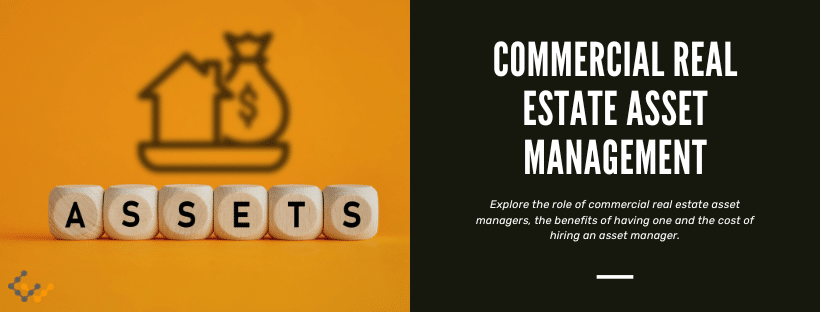A Guide to Commercial Real Estate Asset Management

Commercial real estate asset management is the method used to determine how effective a project or property is in achieving the goals the investor sets. In short, it is one of the most important ways to gather information to make a decision about assets before purchase or, in some cases, in the decision to liquidate.
What is Asset Management in Commercial Real Estate?
Asset management in commercial real estate is the process used to analyze a property to develop an effective strategy that minimizes risks and ensures long-term profitability and return on investment. The utilization of these services can help to ensure real estate portfolios meet the goals of stakeholders and will maintain those goals into the foreseeable future. These services are often designed to provide high-level data and insight to ensure that investors are able to have the information they need on hand to make decisions.
With the use of asset management professionals, investors are able to invest without as much hands-on insight and work. Rather, this creates a more passive investment method, as the investor relies on the assistance and skills of an asset manager or team to make key decisions.
Answer a few questions and get custom mortgage quotes. We'll match you with offers from our network of 650+ lenders.
What are the Responsibilities of Asset Managers in Commercial Real Estate?
Asset managers in commercial real estate typically have the goal of maximizing the value of a property to achieve the highest return on investment. Their responsibilities fall into specific categories:
Development of investment strategies
Asset managers develop and then put into place strategies that are economically sound to help investors achieve their specific goals within their portfolios. They can provide realistic expectations while also providing outstanding strategies to overcome various challenges within the local market or specific sector.
One of the ways these professionals offer benefits is by stress-testing the investor portfolios. This allows for various scenarios to be compared, showcasing strengths and weaknesses. More so, they provide extensive market research on any strategy. Once initial decisions are made, the organization will then work to grow and develop the strategy, making adjustments if and when there is a need to do so.
Management of property
Commercial real estate asset managers help to manage and maintain the investment property. They also market the available property to help ensure the best portfolio returns on the asset. This alleviates the time commitment that investors must have.
To achieve these goals, the asset manager may handle the hiring and management of property personnel. They handle the negotiation of all contracts for the property, manage upkeep and renovation costs and requirements, and are hands-on with all contractors involved.
They provide experience
One of the core benefits these professionals bring to the table is their extensive experience in the commercial real estate industry. It is their experience that gives them the ability to help investors ensure the best outcome possible. Often, this experience is beyond what investors themselves have.
Core to this service is providing insight into updates and changes to strategies. They can oversee and provide feedback on changing market conditions. Asset managers also invest the necessary time in supporting the development of new strategies and portfolio growth over time.
Additional tasks and responsibilities include:
- Negotiating property agreements and leases
- Assisting with transactions in the buying and selling of assets
- Full cash flow management
- Asset marketing and property valuable improvement to maintain and grow value
- Create and manage financial projections
- Create and manage budgets
Benefits of Asset Managers in Commercial Real Estate
The benefits of utilizing asset managers within commercial real estate investments are numerous. Though each scenario is a bit different, most investors who use a commercial real estate asset management team are likely to see less risk exposure and better economic outcomes to achieve their specific goals. Some key benefits include:
- Ensure the property fits into the investor’s objectives and financial goals
- Aid investors in making informed decisions about their portfolio, including individual properties
- Supporting the investor in maximizing their investment potential with any property both in the purchase and later in improving value to meet market expectations
- Handling due diligence on behalf of the investor allows for a more streamlined process when purchasing, as investors can trust in the asset manager’s experience and knowledge.
- Work with investors to determine the ideal holding period to maximize the returns on the property
- Work to improve cash flow on struggling properties, helping investors to improve portfolios.
- Help in securing commercial financing at the most affordable rate and ideal terms
Because asset managers provide exceptional guidance and support at such a high level, having these professionals available helps to provide investors with more peace of mind while also enabling stakeholders to achieve more of their goals.
How Much Do Real Estate Asset Managers Charge?
Various factors play a role in the cost of hiring a commercial real estate asset manager. Typically, these professionals charge a fee of 0.5% up to 3% of revenue. Some may charge a fixed fee for the services they offer, especially if they are working on a per-project basis rather than on an ongoing basis. Most commonly, the property’s total monthly gross income is used to determine the asset manager’s fee.
How are Asset Management Fees Calculated
Asset management fees are determined and agreed upon in initial contracts. Typically, the fee is a percentage of the property’s monthly revenue, not the profit produced. For example, if a commercial property nets $100,000 per month in revenue for the property investor, the asset manager is paid between $1,000 and $3,000 per month.
Typically, there are additional fees charged, including acquisition fees, disposition fees, as they apply to the project, as well as construction management fees if this applies.
How is Property Management Different from Asset Management?
It is important to note that real estate asset management and property management are two very different components of managing real estate. In property management, the team handles screening tenants, collecting rent, and working with contractors. By contrast, real estate asset managers focus more heavily on the financial strategies and cash flow of a property.
There are benefits to having a property manager in addition to an asset manager. Property managers alleviate the day-to-day, hands-on work of owning and managing commercial real estate. They tend to have a hyperlocal focus on the property and community as well. They can handle the hard work of enforcing a lease term or nonpayment while also working to maintain good relationships on behalf of the investors for the tenants.
Asset managers are less hands-on but often more extensive in their experience in the sector. They also tend to be able to handle more of the financial decision-making based on investor goals and strategies, but also based on opportunities they see present in the market. In many situations, these professionals also help to provide decision-making and advice regarding tax and legal matters related to the property as well.
Wrapping Up
A commercial real estate asset manager is a highly skilled professional who brings industry insight to the portfolio of any investor. With their knowledge and dedication to providing clients with exceptional legal insight and support, these professionals can help investors make better decisions about any property, whether they are just purchasing or they are working to better existing portfolio holdings.

